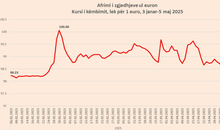
 Flash News
Flash News
Student falls from second floor of school in Gjirokastra
From the maritime agreement with Greece to the Rama-Soros connection, Berisha speaks about the Greek media
The collapse of the massive chrome mine, still no sign of the old man in Klos
Video/ Serious accident in Peshkopi, drunk driver takes money from police officer
Serious in Prizren, father kills 15-year-old daughter, injures wife and other daughter
The fall of the euro is boosting imports in quantity, increasing by 14% in 2024

The exchange rate has had a series of knock-on effects on the country's economy, from declining exports, bankruptcies of producers, and increased imports in quantity.
In 2024, 6.2 million tons of goods were imported, an increase of about 14% compared to 2023 (see graph below). Data show that despite lower prices, the volume of imports has expanded, keeping budget revenues on an upward trend over the past year.
The Ministry of Finance estimated that the negative effects of the exchange rate on customs revenues last year were 17 billion lek or 170 million euros. However, the decline in the euro has had an indirect positive impact on customs revenues, as cheaper prices have increased imports in quantity.
The euro's decline has made imports of goods cheaper. Since VAT and other tariffs are levied as a percentage of prices, customs have collected less direct revenue per unit of goods. But last year, imports increased by 14% in volume and by only 2.5% in value. The increase in imports has offset the decline in revenue generated by the exchange rate.
For 2024, taxed imports increased by 16% in weight compared to the previous year, while their value increased by 6%. The opposite happened with exports. They increased in quantity by 1%, but decreased in value by 14% due to the fall of the euro.
The average exchange rate in 2023 was 102.8 lek, while last year it was around 100.7 lek. In 2021, the euro was exchanged for 123 lek, while in 2016 it was 138 lek.
The data on foreign trade for the year we just closed proved that the Albanian economy has lost competitiveness in international markets. The income earned from tourism and foreign investments is going abroad for supplies of goods, signaling that the manufacturing sector, instead of expanding from the increase in visitors, is falling into the abyss.
According to official data, in 2024, exports recorded the largest decline since at least 2005, when the earliest data were reported by INSTAT. On the other hand, imports recorded a value of 894.3 billion lek with an annual growth of 2.4 percent, while in quantity they increased by 14%. The decline in exports and the increase in imports caused the trade deficit to record a historical record of 521.7 billion lek (5.2 billion euros).
Detailed data shows that the increase in imports is being driven by the needs of the tourism and construction sectors for goods. For example, the groups that have experienced a high increase in imports from abroad belong to hotel supplies such as sunshades, furniture and straw products, construction materials such as cement, melamine, glass, etc.
It took Albania almost three decades to establish its manufacturing sector and the "Made in Albania" brand for European markets, but the exchange rate and several accompanying factors such as increasing domestic costs and falling foreign demand have destroyed in two years what was built with effort over more than two decades./ MONITOR
Latest news



Student falls from second floor of school in Gjirokastra
2025-05-06 15:14:37
LDK proposes transitional government
2025-05-06 15:03:19


Incident in Korça, court releases Bledion Nallbat's brother
2025-05-06 14:27:19
Kopliku: The vote on May 11 for the DP-ASHM is the deserved punishment for Rama
2025-05-06 14:21:23
"Revival Caligula", Bujar Kapexhiu's gem of a caricature about Rama
2025-05-06 14:12:06
Rama's former negotiator, Zef Mazi, rejects EU passport propaganda
2025-05-06 14:07:43
The president of the Forza Italia senatorial group supports Berisha on May 11th.
2025-05-06 13:57:57
The Appeal Court of Appeal declares the mayor of Devoll, Eduard Duro, innocent.
2025-05-06 13:52:33

May 11th Elections, Bylykbashi: Extend the validity period of documents
2025-05-06 13:29:39

Convicted in Greece, after SPAK DP request to ILD: Dismiss judge Irena Gjoka
2025-05-06 13:09:35
Electoral crimes, SPAK takes stock: 115 reports have been filed so far
2025-05-06 13:00:37
Quarrel between two families in Has, two people injured
2025-05-06 12:53:08
Voice before SPAK: I do not withdraw from the accusations against Vilma Nushi
2025-05-06 12:33:33


"Giro d'Italia" in Albania, here's how car traffic changes in Tirana
2025-05-06 12:04:17


The collapse of the massive chrome mine, still no sign of the old man in Klos
2025-05-06 11:29:31
Xhaferri: Crime gangs work for the MPs they want
2025-05-06 11:19:53
Zhupa in Ksamil: 'The Maldives of Europe' turned into a trash can
2025-05-06 11:10:55
Merz fails to be elected German chancellor
2025-05-06 11:00:00
The fall of the euro is boosting imports in quantity, increasing by 14% in 2024
2025-05-06 10:56:33
Accident in Roskovec, two passengers injured
2025-05-06 10:47:36


DP denounces election crimes in Peshkopi to SPAK
2025-05-06 10:18:20
The hearing against Mediu is postponed, due to Irena Gjoka's medical report.
2025-05-06 10:08:50
Two accidents in Elbasan, 1 victim and 2 injured reported
2025-05-06 09:52:26


Rama pressures citizens: Either vote for the SP, or don't vote at all
2025-05-06 09:15:00
From defense to immigration, what does the new German government promise?
2025-05-06 09:08:42
After 1,245 days in office, Scholz steps down as chancellor
2025-05-06 08:55:38


'Vote Exchange': Shkodra between the PS-PD rivalry and the "Doshi" factor
2025-05-06 08:29:28
Horoscope, what do the stars have in store for you today?
2025-05-06 08:23:05
Rain returns, what is the weather expected to be like during the day?
2025-05-06 08:06:41
Morning Post/ In 2 lines: What mattered yesterday in Albania
2025-05-06 07:50:44

Topalli: Small parties have no chance of getting a mandate
2025-05-05 22:42:40
SP officials in prison for corruption, Rama: We are not a law firm
2025-05-05 22:36:42


Soul-touching hours: Discover when we are saddest and happiest during the day
2025-05-05 21:47:20
Alimehmeti: DP in Tirana gets more than 12 mandates
2025-05-05 21:34:33


Berisha: Rama knows Dibra as much as Toni Gogu knew Hajredin Pasha
2025-05-05 21:01:00





27-year-old drunk driver hits police officer in Peshkopi
2025-05-05 19:50:14
'Giro d'Italia' in Albania, how will vehicle traffic be diverted in Tirana
2025-05-05 19:36:32
Meta: Rama is afraid of losing, that's why he calls for non-participation
2025-05-05 19:25:19


Këlliçi: Let's stop propaganda and return Tirana to the citizen
2025-05-05 18:43:47
Rama deepens scandal, calls again for election boycott
2025-05-05 18:25:53


Indian learns 80 numbers in 13.5 seconds, becomes world champion
2025-05-05 17:50:22

The moral damage of promises, an electoral bubble
2025-05-05 17:23:59
Albanian arrested in France, caught with 11 kg of cocaine
2025-05-05 17:08:22


The best and worst foods for a healthy liver
2025-05-05 16:41:45
Another country lifts visa requirements for Kosovo
2025-05-05 16:28:49



Judicial confrontation with OSHEE, Bardhi is declared innocent
2025-05-05 15:50:40
Bozdo: The panicked SP is preparing vote buying
2025-05-05 15:41:06
Zhupa publishes drone footage: DP will cancel the strategic investment law
2025-05-05 15:37:29

The week starts badly for 3 zodiac signs, here's what the stars predict!
2025-05-05 15:13:53
73-year-old arrested for wounding brother in Malësia e Madhe
2025-05-05 15:04:20



Jonathan Islam falls from a parachute
2025-05-05 14:36:21

Lawsuit filed against Dodik, accused of insulting Bosniaks
2025-05-05 14:12:48


Topalli denounces SP officials: They are manipulating votes in Greece and Italy
2025-05-05 13:49:25
Monika Kryemadhi appears at SPAK dressed in black
2025-05-05 13:24:47


